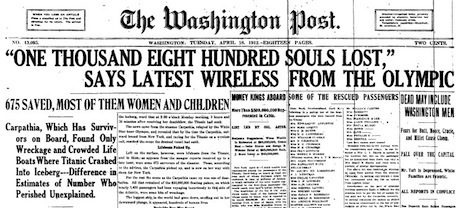From July 11, 2015, “A deeper shade of soul“:
Newspapers used to use the word “souls” in headlines. “43 Souls Lost at Sea,” or “11 Souls Perish in Mine Collapse.”
This was a long time ago, of course, a century or so back. We don’t use that word “souls” in headlines any more — just as we rarely use the verb “perish.” Talk of “souls” is both too religious and too Platonic — suggesting the notion of a duality between mortal flesh and immortal spirit.
That idea of the “soul” — going all the way back to Plato and haunting us ever since — remains inescapable and unavoidable, even if we now avoid it in our headlines about shipwrecks and other disasters. For all the many challenges to the idea from philosophers and theologians and scientists, this dualism of body and soul persists and pervades our thinking like a kind of background noise.
To be clear, I do not believe in that idea of the “soul.” I think it is profoundly, dangerously misleading to think of our selves as souls inhabiting physical bodies. But I still believe that talk of souls matters — that it attempts to articulate something important and vital and essential.
“Do you believe you have a soul?” someone asked me recently. And what I wanted to say was, “No. I don’t believe I have a soul, I believe I am a soul.” But the ghost of Plato makes it almost impossible to say that without suggesting that if I am a soul, then I must merely have a body. And I don’t believe that either.
This is what fascinates me about those old newspaper headlines. They employ the word “souls,” and we bring to that word all of our Platonic, dualistic baggage and assumptions about what that word means. But their use of the word suggests something wholly incompatible with those dualistic ideas.
Their use of the word — their appeal to the concept — is quite the opposite of what we expect when we approach that word with all of the connotations we’ve absorbed from Plato and Augustine and revivalist altar-call soteriology. Plato and Augustine and Billy Graham have all trained us to think of immortal souls dwelling, temporarily, within mortal bodies.
But those old headlines didn’t say “1,800 Bodies Lost at Sea.” They spoke of souls dying — of souls perishing.
Whatever it was those headlines meant by “souls,” it wasn’t the same as the Platonic/Augustinian dualism that colors so much of our speaking and thinking about souls. The word here was used interchangeably with simpler, less fraught, words like “people” or “lives.” It was chosen, in part, because those words can seem inadequate to the reporting of tragedy. These weren’t just any lives — they were humans. They weren’t just faceless, nameless people, but unique individuals. And reaching for some way to convey all of that, these old-timey headline writers sometimes latched onto the word we’ve long used to attempt to articulate this ineffable aspect of our humanity. Souls.
Despite the long shadows of Plato and Augustine, this too is something — something else — that we humans have long meant or tried to communicate with our talk of souls or of the soul.
I think this half-grasped, inadequately articulated idea is important because I think it is true. And I think it’s worth the hard work it requires to separate this from the old dualisms and to preserve the language here — to save our “souls.” This is likely a case where the connotations of the word bear more meaning than any attempted denotation — a word more useful for what it suggests than what it defines, for what it points toward more than what it pins down.
All of which is to say, in response to that question I was asked, “Yes, I believe in souls.”
What do I mean by that, exactly? Well, that’s a bit more complicated. It’s probably easier to say what I do not mean by that than what I do. But here’s part of it: I believe that being soulful is good and being soulless is bad. I believe in whatever it is that the music of Al Green or Aretha Franklin comes from, and whatever it is that receives it. I believe that The Powers That Be will sometimes make you an offer at a crossroads, asking, in return, for something that is both seemingly unsubstantial and vitally essential.
I believe that souls — whatever that means — can be saved, and shaped, and starved, and stunted, lost and found and born again.
Had a lot of terrific ’80s songs to choose from for the title of this post seven years ago. Coulda gone with Midnight Oil. Or T’Pau. But the chance to remind myself and others of the existence of this delightfully sunny bop was irresistible:













